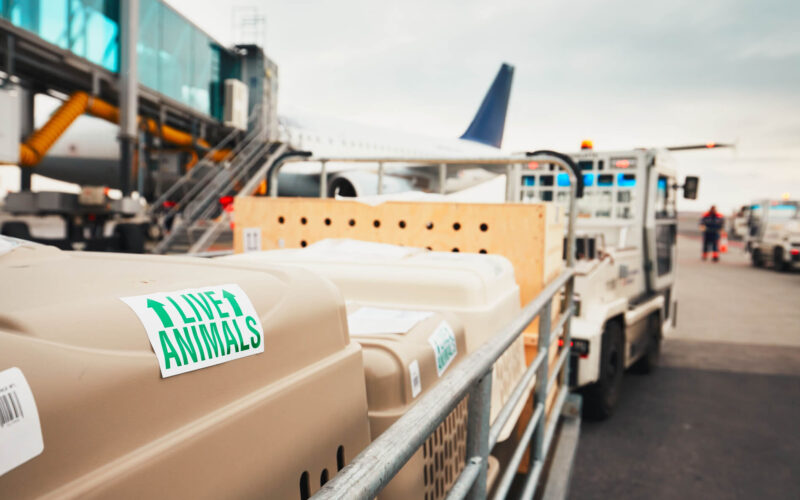On the contrary to passenger traffic that has significantly dropped due to COVID-19 pandemic, animal cargo flights have only increased.
In 2020, cargo planes have transported thousands of pigs, goats, alpacas, cats, and dogs on international flights, reported the Wall Street Journal. Transporting animals is one of the most complex and growing areas of air cargo. The demand is also varied – from domestic animals to exotic fish and animals for zoos.
For example, Qatar Airways has added 50% more livestock flights in response to higher demand during the year. On a typical day, the airline transports 10 horses and 500 farm animals, including cows, goats and sheep.
Special requirements
Animal transportation requires care and special attention, including customized equipment and temperature-controlled ventilated areas on the aircraft. Brussels Airport has opened a new Animal Care & Inspection Center where light and temperature levels can be adjusted depending on the needs of animals.
Hundreds of pigs can travel on one cargo flight. In October 2020, Russian airline AirBridgeCargo Airlines, which claims to be giving 1st class service to various animals it transports, flew 719 breeding pigs from Sheremetyevo International Airport in Moscow to Vladivostok on a Boeing 747 charter flight. The pigs have to be transported in large wooden crates with enough space for them to move around. Therefore, spacious Boeing 777s and 747s or Airbus A330 aircraft are often used for the task.
During the pandemic, many people are returning back to their home countries from all around the world. Thereby, the number of transported domestic animals, especially cats and dogs, have also increased. Airports are constantly adjusting to the animal traffic. For example, Hamad International Airport (DOH) has a dedicated facility for animals waiting for their connecting flight.
“All pets travelling via Hamad International Airport enjoy the comfort of our dedicated live animal facility while they wait for their connecting or departing flights,” is announced on DOH website. “This is a secure and climate-controlled environment that is supervised by trained animal handlers.”
Horses – the frequent flyers
Horses are one of the most prominent animals to be transported around the world. They fly both internationally and domestically. The main reason for travel is usually horse races, shows and exhibitions around the world. Individual countries have different requirements for animal transportation and quarantine. Horses now also require passports to be able to fly and compete in events.
Usually, horses travel on the main deck of a cargo freighter aircraft. They are loaded into specially equipped horse containers at the airport. Each container has from one to three stalls. Three horses per stall is the “economy class” configuration, while one horse per stall would qualify as a “first class” configuration.
Cargolux, one of the airlines providing the service, states that a maximum of 90 horses can fit in its Boeing 747-800 freighter while its 747-400 freighter can handle 84 horses.
Wilfred D’Souza, who manages the cargo scheduling at Emirates SkyCargo, says that in order to keep the animals comfortable during the flight, the company avoids loading horses near other animals, including the female horses, or perishables that could distract them. Also, pilots try to avoid turbulence and sharp descents or ascents not to disturb the “passengers”.
“These horses are frequent flyers and used to the experience. In 15 years, I can only recall one instance where we had a restless horse at the boarding stage, that we had to offload; and it wasn’t even a thoroughbred,” said Hiran Perera, the cargo planning and freighters senior vice president for Emirates SkyCargo.
On November 28, 2020, Intradco Global, animal transportation air charter specialist, flew a very special “passenger” – a 2 year old filly Cindy Truppo. Intradco Global in collaboration with Bluebird Nordic, both part of the Avia Solutions Group, flew Cindy Truppo on a charter flight number B737F. The flight took off from Berlin, Germany to land in Naples, Italy, where the horse was participating in a race. According to Intradco Global, the journey was smooth and Cindy Truppo ended up winning the race. The company helped the champion to safely return back home to Berlin.
Animals’ flight attendants
Just as on a passenger flight, animals get to have their flight attendants too. Animal handlers are on board of each cargo flight carrying animals. They are keeping an eye on the animals, making sure they feel safe and have food and water during the flight.
“The extremely high-end horses usually travel with a professional groom, who is someone they are comfortable with and who can take care of them on board, as well as a veterinarian,” says D’Souza.
When transporting horses, the so-called “flying grooms” are on board to accompany the transportation process and make sure the horses are fed and well-hydrated. They must undergo the same passenger security screening to board the aircraft as normal passengers do in the passenger terminal. There are between five to eleven seats per cargo flight to accommodate grooms.
“Professional flying grooms are all experienced equestrians who know and understand horses and their behaviours. The grooms are on-hand to monitor their condition to ensure they remain calm, comfortable and safe throughout the flight,” says Intradco Global.
Not all animals can fly
Some airlines are no longer transporting several breeds of snub-nosed dogs and cats on their cargo aircraft. Due to shorter snouts and underdeveloped respiratory systems, those animals are more sensitive to air quality and temperature changes. These types of cats and dogs have difficulties breathing and their conditions get only worse in higher altitudes.
Cargolux does not transport primates, animals for research laboratories and animals from the wild. In June 2018, the company banned the transporting of hunting shipments and trophies, such as lions, leopards, elephants, rhinos, and buffalos as the practice did not align with the company’s ethical engagements. Other companies, such as Delta Cargo, also have banned the transportation of hunting trophies.

